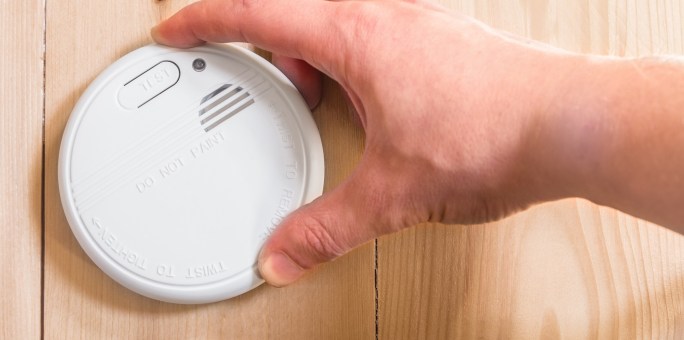5 Tips for Fire Prevention Week

Fire Prevention Week was established in 1925 to help educate the public on fire safety, and it is still observed every year during the week of October 9. While no one expects to have a fire in their home, the reality is that fire departments in the United States respond to a fire call every 24 seconds, according to the National Fire Protection Association (NFPA).
To help protect yourself and your family, it’s important to know how to avoid some common fire risks. Here are five home fire safety tips to keep in mind.
1. Use Caution When Cooking
Cooking is the biggest cause of fires and injuries in homes, according to the NFPA. And, of these, unattended cooking is the leading factor. So, stay in the kitchen if you’re frying, boiling, grilling or broiling food, and, if you have to leave — even for a short time — turn off the stove. Remain nearby if you are simmering, baking or roasting, and use a timer to remind you to check the food often.
Other cooking safety tips from the NFPA include:
- Stay alert! If you’re sleepy or distracted, don’t use the stove or oven.
- Check food regularly.
- Keep anything flammable, such as oven mitts, dish towels, wooden utensils or food packaging, away from the cooktop.
- Maintain a “kid-free zone” at least three feet around the stove or where any other hot food is being prepared (such as near a slow cooker).
2. Heat Your Home Safely
As the weather starts to get colder, it’s important to keep your home warm — but do so safely. Consider the following heating safety tips from the NFPA:
- Keep anything flammable at least three feet away from heating equipment, including a furnace, space heater, fireplace or wood stove.
- Turn space heaters off before leaving a room or going to sleep.
- Never leave pets or children unsupervised near a space heater or wooden stove (the NFPA again recommends a 3-foot “kid-free zone”).
- Do not use your oven to heat your home.
Also, have your furnace and fireplace, if you have one, cleaned and inspected by a professional before using them this winter.
3. Check Electrical Cords
About 2,000 fires each year are due to damaged electrical cords, overloaded plugs or short circuits, according to the Consumer Product Safety Commission (CPSC). Check all your electrical cords for fraying, cracks or other signs of wear, and replace damaged cords or have them professionally repaired. Avoid running extension cords across doorways or under carpeting, says the NFPA. The CPSC also recommends that consumers:
- Use extension cords only when necessary and not for an extended period of time.
- Avoid overloading outlets and power strips with more plugs than they are intended for.
- Use cords labeled “for outdoor use” when using appliances or tools outside.
- Purchase and use cords, power strips, etc. that are certified by an independent testing lab (check the label).
4. Replace Open-Flame Candles With Flame-less Candles
Whether you enjoy a scented candle or are decorating for the holidays, open-flame candles can be a fire hazard. Instead, the NFPA suggests choosing flame-less candles, such as battery-operated LED versions. These flame-less candles often flicker and sometimes even smell like the real thing.
If you choose to use open-flame candles, the National Candle Association provides the following safety tips:
- Keep burning candles within sight. Always blow candles out when you leave the room or go to sleep.
- Use sturdy, heat-resistant candle holders that won’t topple easily, and make sure they are large enough to catch dripping wax.
- Place candle holders on a stable, heat-resistant surface.
- Keep all candles away from anything flammable, such as curtains, bedding, decorations and books.
5. Test Your Smoke Detectors
Smoke detectors can be your first line of defense from harm. Test your smoke detectors once a month, says the NFPA, and change the batteries at least once a year (consider doing this at the beginning or end of daylight saving time). Replace any smoke detectors that are more than 10 years old, says the NFPA. This is also a good time to check that you’re following the NFPA’s recommendations for smoke alarm placement: Install one inside every bedroom, outside each sleeping area and on every floor in your house, including the basement.
Fire Prevention Week is a great time to plan and practice good safety habits — making sure you’re helping to protect your home and family against common fire risks. A little preparation and basic maintenance may help prevent a fire in your home and help ensure you’ll be alerted in case the unexpected happens.
Source: https://al.st/2MpNYhD

